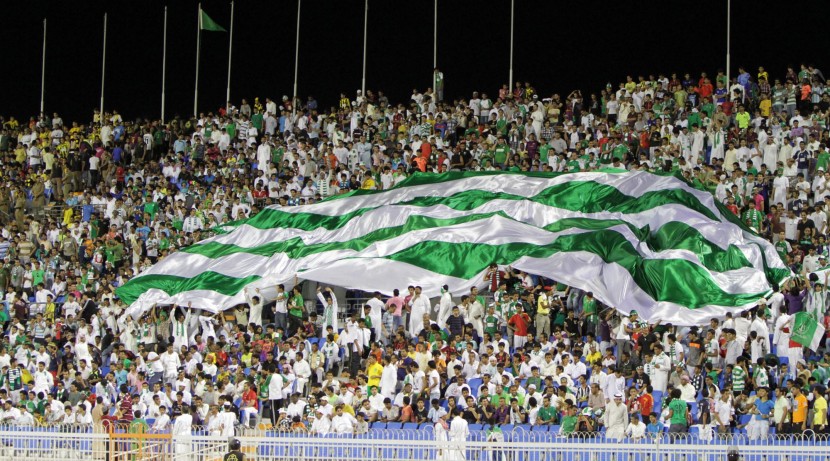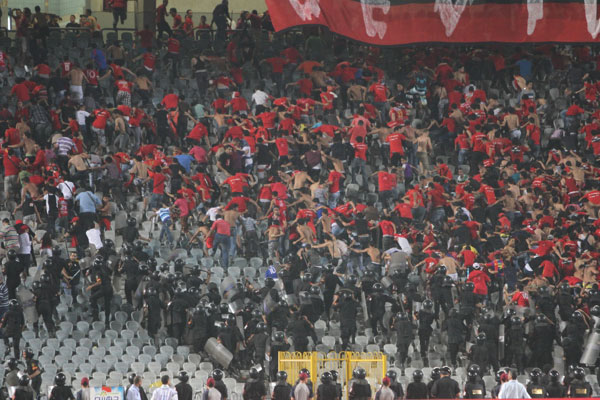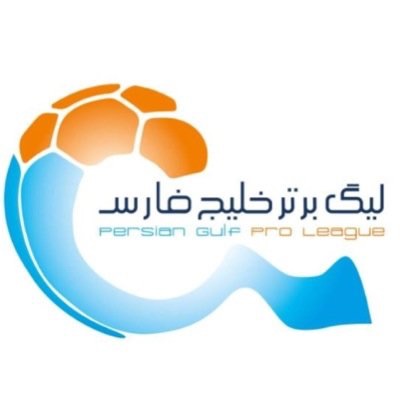-
 The Ryan Babel (Flop of the Season) Award
12 months ago
The Ryan Babel (Flop of the Season) Award
12 months ago -
 Ahdaaf Alternative Awards – The Titus Bramble Award
12 months ago
Ahdaaf Alternative Awards – The Titus Bramble Award
12 months ago -
 Ahdaaf 2018 Predictions
2 years ago
Ahdaaf 2018 Predictions
2 years ago -
Trafalgar D Law – White Trash Novel
1 day ago -
Getting in the Proper Online Law School Software
1 day ago -
The Carmel Performing Arts Center For the Analysis of Koans
1 day ago
Are Police & Army Teams Killing Fan Culture in The Region?
Do you support a club called Jaish? you may want to look away now!
If you happen to be a long time follower of the Qatari Stars League (QSL) or even the AFC Champions League, you may have noticed the emergence of two clubs in the past five years, El-Jaish SC & Lekhwiya SC. The former was established in 2011 while the latter is just two years its senior.
In the past four seasons, Lekhwiya won three league titles, only missing out on the 2012/13 title after finishing second, 5 points behind the country’s most successful club, Al-Sadd. In turn El-Jaish upon its foundation in 2011 played in the QatarGas League, the second (and lowest) tier of Qatari football and instantly won promotion to the QSL. In the following season, they finished second, 2 points behind Lekhwiya and went on to finish third and second respectively in the following two seasons. At the time of writing this article, Lekhwiya are second in the league while El-Jaish are third with more than half the season played already.
This would have been an extraordinary story, worthy of multiple headlines had it happened in a top European League. However, it is not completely unprecedented in this part of the world. In fact, it becomes all the more familiar when you know that El-Jaish is Arabic for “The Army”, and Lekhwiya is the local Qatari name for “Internal Security Forces”.
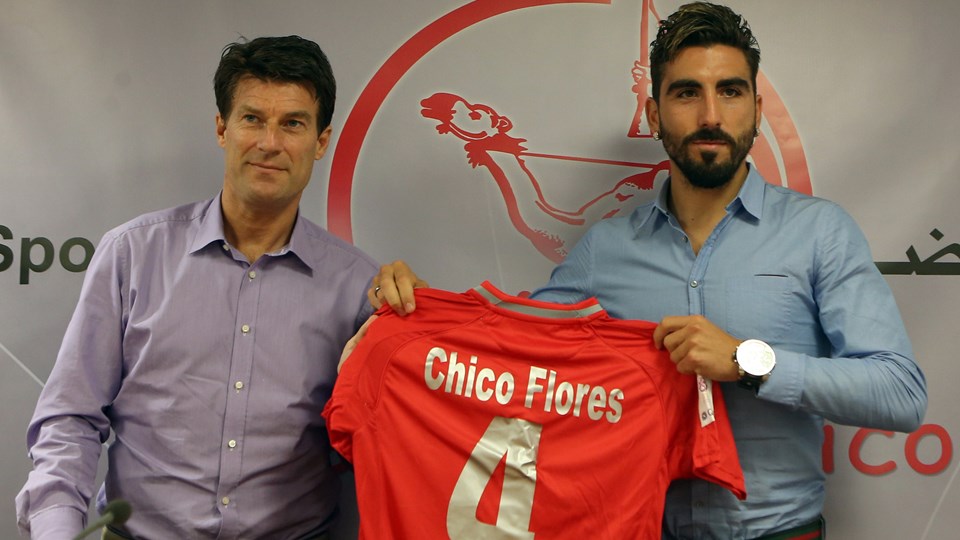
Lekhwiya Unveil defender Chico Flores & manager Michael Laudrup, both signed from English Premier League side, Swansea City.
The enrollment of Police, Military & Security Force football teams in professional leagues is a common phenomenon not only in the Middle East, but in most developing countries where those state armed units have a significant influence on the political scene as well as on the everyday lives of ordinary citizens. Thailand is one example outside the Middle East where clubs like Army United & Air Force Central have regularly featured in the top flight and competed for honours with varying degrees of success. Thailand’s troubled history of military coups is well documented, and the link between the two is anything but arbitrary. Pakistan is another good example.
Within the Middle East, names like Jaish and Shurta “The police” are repetitive across various domestic leagues, the most famous being Al-Jaish FC of Syria who have won a record 12 Syrian League titles (including 5 in the new century) and were crowned champions of the inaugural AFC Cup (Asian equivalent of the Europa League) in 2004. In turn, Al-Shurta of Iraq are a regional powerhouse based in Baghdad, they have won the Iraqi league 4 times and were the first ever winners of the now obsolete Arab Champions League in 1982. Al-Shurta play a local rivalry with Al-Quwa Al-Jawwiya “Air Forces FC”, another state force team from Baghdad. The now suspended Egyptian Premier League features no less than five teams representing various Police and Army units including Haras El-Hudood “Border Guards” & El-Entag El-Harbi “Military production”. Three of those teams made their Egyptian Premier League debut in the new millennium.
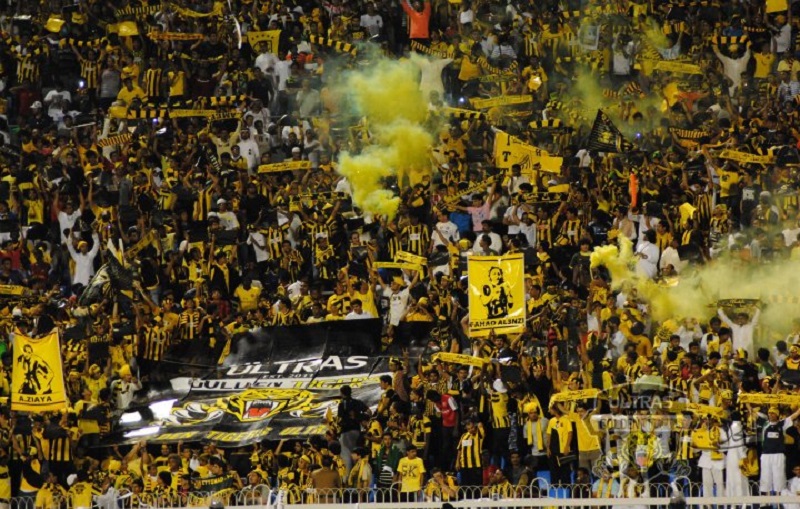
Saudi Arabia’s Al-Ittihad boasts one of the largest follower bases in the region, even our own Dan Pascual is a fan!
Fandom as a concept is largely associated with loyalty and the warmth of belonging to a particular entity, and football clubs have always offered just that for millions across the globe. Kuper and Szymanski argued in their book “Soccernomics” that European teams with largest fan bases in their countries came from industrial cities like Manchester, Liverpool, Turin, Glasgow, St. Petersburg and Munich as opposed to traditional capitals like London, Rome, Edinburgh, Moscow and Berlin; this was directly attributed to blue-collar workers in these cities finding a sense of community and belonging in the local football team.
Of course, Middle Eastern cities are different and the concept of a 19th century industrialised city is largely inapplicable here. But let us take a look at some of the most supported teams in the region. Clubs like Al-Sadd in Qatar, Al-Ittihad in Saudi Arabia and Al-Ain in the UAE. Those three teams have all been established even before their respective nations became independent sovereign states and have thus long been engraved in the living memory of the local residents, those teams have been part of their local communities through thick and thin, long before corporate culture and concepts like CSR came to the region. Their legendary players and coaches were all once the kid next door, anthems and chants became a heritage and were passed from generation to the next. They brought trophies and joyous celebrations to their towns and neighbourhoods for decades.
For all their recent successes and massive wealth, the Al-Jaishes and Al-Shurtas of this region are unable to manufacture this unique link. Not many outside the military or police institutions identify with those teams. In fact, in many Middle Eastern countries, the army and even more so the police have traditionally been tools for repression, used by authoritarian regimes to silence dissidents; hence there is an unshakable negative connotation surrounding those institutions and ordinary citizens are unlikely to associate with football teams representing them. The gulf to be bridged is even wider when the vast majority of the state unit’s members are foreigners such as in the case of Lekhwiya.
The 2011/12 QSL season epitomised a worrying trend; Lekhwiya & El-Jaish finished in the top two positions respectively. Meanwhile, Al-Ahly, one of the nation’s most supported historical clubs, was relegated. Al-Ahly was founded in 1950 which may not seem old when compared to many European clubs, but to put that into perspective, Qatar only gained independence 21 years later and was yet to even have a currency back then and the club used to rent their base from a local landlord for 70 Indian Rupees.
The pattern continued with the same two teams finishing in the top three last season and yet another one of Qatar’s legendary clubs, Al-Rayyan, arguably the most popular alongside Al-Sadd & Al-Arabi, dropping into first division’s obscurity.
El-Jaish came into the picture in 2011 and as they won promotion to the QSL, they went on a spending spree signing numerous local stars such as former Al-Sadd captain, Wesam Rizq and Al-Gharrafa veteran Saad Al-Shammari. They didn’t stop there, but naturalized a number of Arab and African players and registered them as locals and recruited a couple of foreign players to allow them to compete with the likes of Al-Sadd and Lekhwiya.
One thing El-Jaish could not buy was fans. While QSL is known for its comparatively low attendance levels, perspective is vital here. For a nation of 2 million people, only 300,000 of whom are locals, to expect a 50,000 crowd week in, week out is certainly unrealistic. But when Al-Sadd, Al-Arabi and Al-Rayan played each other, they regularly drew crowds in the region of 7,000-10,000 fans. Those figures are now becoming a thing of the past despite the best efforts of the league committee. Free entry, raffle draws and matchday family events have all been tried to no avail. The fact remains that outside a few hundred foreign workers who are paid by clubs’ officials to attend the matches, there is very little interest in going to stadiums.
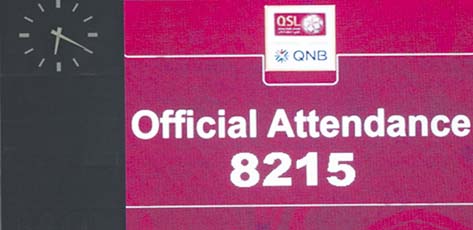
8215 fans may not look impressive, but when adjusted for population, this is the equivalent of 200,000 fans attending an EPL match!
Teams like El-Jaish and Lekhwiya regularly mobilize off-duty soldiers and officers to cheer for the players. Sometimes it is a bus load of school students or workers but manufactured presence aside, the emergence of these clubs is badly hurting an already dying fan culture in Qatar and the region. Increased TV coverage and the growth of luxury lifestyle among the nouveau riche of the oil boom have already taken their toll on matchday attendance levels, but this new phenomenon of state affiliated departmental teams is threatening to kill whatever is left of it.
- how much does a mail order bride cost - May 8, 2020
- The college essays that got one student accepted to Stanford University - May 6, 2020
- Essay – Online Tutorial using WebQuest Animation - May 6, 2020
- MLA Tutorial #1: Basic Paper Formatting - May 6, 2020
- The Ryan Babel (Flop of the Season) Award - June 9, 2019
- Ahdaaf Alternative Awards – The Titus Bramble Award - June 7, 2019
- Turki Al Alshaikh: The Controversial Revolutionary Reshaping Middle Eastern Football – Part 1 - July 1, 2018
- Reds in the Sand: Three Liverpool Men Who Played in UAE - January 10, 2018
- Ahdaaf 2018 Predictions - January 2, 2018
- Abu Dhabi’s Al Jazira Club to Build Shopping Mall - October 31, 2017
Similar posts
-
 CountriesInternationalsRegional Competitions
CountriesInternationalsRegional Competitions
The Gulf crisis, Fossati’s resignation and the naturalisation conundrum
-
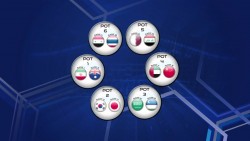 Internationals
Internationals
WCQ2018 Asia: 6 Talking Points from the Middle East
-
 Internationals
Internationals
PRESS TALK: August 31, 2016
-
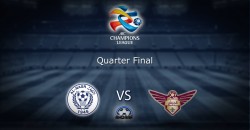 AFC Champions League
AFC Champions League
PREVIEW: EL-JAISH VS. AL-NASR | #ACL2016
-
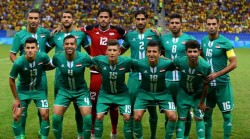 InternationalsYouth Competitions
InternationalsYouth Competitions
The world came to see Neymar but found Iraq
-
 Scout Reports
Scout Reports
SCOUT REPORT: Akram Afif

